Wir haben uns beim Online-Festival Contre Le Racisme vorgestellt (ab Minute 24:00). Tolle Acts, viele gute Beiträge. Schaut mal rein: https://www.contre-le-racisme.de/
Tag Archives: 2020
[Chios/Griechenland] Solidarität ohne Grenzen gegen die Repression gegen Proteste Geflüchteter in Griechenland während der COVID-19 Pandemie
SPENDENAUFRUF der Kampagne Cant evict Solidarity: Solidarität ohne Grenzen
Repression gegen die Proteste Geflüchteter in Griechenland während der COVID-19 Pandemie
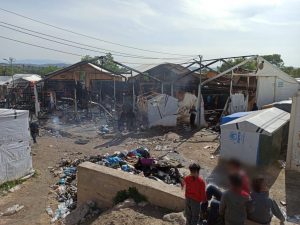
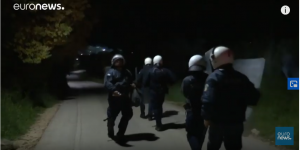
Gewalt und Repressionen gegenüber Menschen auf der Flucht wird immer brutalter und repressiver. Die aufgrund der Pandemie angeordneten Ausgangsbeschränkungen treffen diese Menschen besonders hart. Zusätzlich legitimiert die Pandemie der Politik und der ausführenden Organe noch brutalere repressivere Maßnahmen. Exemplarisch drei Spotlights:
- Die Wut der im Lock-down aufgrund der Covid-19 eingesperrten Menschen hatte sich im Camp Vial auf der griechischen Insel Chios in Protesten entladen, nachdem eine 47-jährige, aus dem Irak geflüchtete Frau am 18. April 2020 an einem Herzinfarkt starb.
.
Zwei Tage zuvor war sie mit Herzrhythmusstörungen ins Krankenhaus gebracht, dort negativ auf Covid-19 getestet und rudimentär mit Medikamenten versorgt worden. Anschließend wurde sie außerhalb des Camps in einem Container als präventive Isolation eingesperrt, wo sie eine Panikattacke erlitt und einen Tag später tot aufgefunden wurde.Auf die Nachricht ihres Todes folgten spontan wütende Proteste hunderter Campbewohner*innen. Als die Polizei eintraf, um die Proteste zu beenden, setzte sie Tränengas und Schlagstöcke ein. Berichten zufolge verteidigten sich einige Protestierenden durch das Werfen von Steinen. Hunderte Menschen versuchten vor den Polizeieinheiten und dem Feuer in die umliegenden Felder zu fliehen, wagten jedoch nicht das Lager zu weit zu verlassen, da die griechische Regierung seit der Corona-Pandemie eine Strafe von 150 Euro für Verstöße gegen die Ausgangsbeschränkungen eingeführt hat. Bei Nichtzahlung droht eine Gefängnisstrafe.Aufgrund des brutalen Einsatzes der Polizei gab es Dutzende Verletzte. Vor allem aber sitzen nun neun Geflüchtete in Untersuchungshaft und sind aktuell wegen Brandstiftung, Sachbeschädigung, Landfriedensbruch und Verstößen gegen das Waffengesetz angeklagt. Für weitere sechs Personen wurde eine Untersuchungshaft beantragt. Ihnen allen drohen nun mehrere Jahre Haft.
. - Anfang April wurde ein Hungerstreik inhaftierter Geflüchteter gegen die Bedingungen im Abschiebegefängnis im Lager Moria auf Lesbos sowie im Abschiegefängnis Paranesti in Nordgriechenland durch Polizeigewalt beendet.
Mit dem Hungerstreik protestierten Häftlinge gegen die grundlose Inhaftierung, die menschenunwürdige Unterbringung und den fehlenden Schutz vor Covid-19. Auf den griechischen Inseln werden Menschen nicht nur nach Ablehnung des Asylverfahrens inhaftiert, sondern viele Menschen gleich bei ihrer Ankunft nach der gefährlichen Überfahrt auf Grundlage ihrer jeweiligen Nationalität. Obwohl Abschiebungen aus Griechenland durch die Covid-19 Beschränkungen auf unbestimmte Zeit ausgesetzt sind, werden die Menschen nicht aus der Abschiebehaft entlassen. Im Gegenteil, Menschen werden gezielt weiter verhaftet.
. - Nachdem der türkische Präsident Erdogan Ende Februar 2020 aus machtpolitischen Gründen den EU-Türkei-Deal aussetze und Menschen an die Grenze brachte, eskalierte die Welle von Rassismus und rechter Gewalt gegen Geflüchtete weiter. Hierbei fielen tödliche Schüsse durch EU-Grenzbeamt*innen am Grenzfluss Evros. Auch hier fand eine massenhafte wahllose Inhaftierung Schutzsuchender statt.
Nun schürt die Regierung eine ablehnende Stimmung in der Bevölkerung mit Ängsten und begründet ihre migrationsfeindliche Politik zusätzlich mit Präventivmaßnahmen gegen die Pandemie. In den letzten Wochen wurde zudem vermehrt von illegalen Push-backs der griechischen Küstenwache auf dem Weg zu den und inzwischen sogar von den griechischen Inseln berichtet.
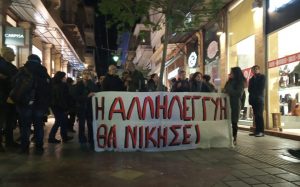 Eine gewaltvolle Bekämpfung von Protesten Geflüchteter in den griechischen Lagern, sowie deren anschließende oft willkürliche Inhaftierung und Kriminalisierung ist fester, struktureller Bestandteil der menschenverachtenden Migrationspolitik der EU. Dieses allgemeine Vorgehen ist während der gegenwärtigen Pandemie wieder verstärkt zu beobachten.
Eine gewaltvolle Bekämpfung von Protesten Geflüchteter in den griechischen Lagern, sowie deren anschließende oft willkürliche Inhaftierung und Kriminalisierung ist fester, struktureller Bestandteil der menschenverachtenden Migrationspolitik der EU. Dieses allgemeine Vorgehen ist während der gegenwärtigen Pandemie wieder verstärkt zu beobachten.
Bereits frühere Repressionsfälle gegen Protestierende zeigten, dass einzelne Personen beispielhaft verhaftet und angeklagt werden, oft vollkommen unabhängig von einer tatsächlichen Beteiligung bei den Protesten. Damit soll jeglicher Protest in den Lagern gegen die katastrophale Situation verhindert werden. In den letzten Jahren wurden mehrfach Proteste von Bewohner*innen des Lagers Moria auf Lesbos gewaltsam niedergeschlagen und wie im Falle der Moria35 monatelang ohne jegliche Beweise inhaftiert.
Die Antwort der Kampagne „You can`t evict Solidarity“ auf die immer brutaler werdende Repressionspolitik ist eine Solidaritäts-Kampagne. Diese schließt Öffentlichkeitsarbeit und finanziellen Support von Gerichtsprozessen der Inhaftierten ein.
Solidarischen Spenden gern auf dieses Konto:
Rote Hilfe e.V./ OG Hannover
IBAN: DE42 4306 0967 4007 2383 57
BIC: GENODEM1GLS
GLS Bank
Verwendungszweck: Cant evict Solidarity
Kontakt:
cantevictsolidarity(at)riseup(dot)net
[Evros/Türkei/Griechenland] Erklärung zum Tod von Muhamad Gulzar, ermordet am Evros Fluss
Declaration by Muhamads comrades from City Plaza: https://www.facebook.com/1568287556796915/posts/2301742346784762/?app=fbl
“A farewell to our friend Muhamad Gulzar, killed at Evros Border
 The rumor of a second refugee killed at the borders, spread three days ago. How could we imagine that it could be our friend? How could this happen? And yesterday the first messages. His wife, appearing in a Sky News reportage. A distant take, outside the hospital, crying and mourning. It was for her, we learned, that Muhamad crossed the borders once again, this time from Greece to Turkey and back to Pakistan. To bring her here and be together.
The rumor of a second refugee killed at the borders, spread three days ago. How could we imagine that it could be our friend? How could this happen? And yesterday the first messages. His wife, appearing in a Sky News reportage. A distant take, outside the hospital, crying and mourning. It was for her, we learned, that Muhamad crossed the borders once again, this time from Greece to Turkey and back to Pakistan. To bring her here and be together.
Last Wednesday, in the morning, our friend Muhamad, our Muhamad from the room 611, was shot dead just for being a migrant. A struggling man, an innocent person, declared as an “enemy” and “invader” of Europe. A civilian shot down like a wild animal.
The bullet came out from a gun at the greek side, a gun that once pointed to the air and once pointed to the group of people crossing the border – was it border police, was it a militia, a greek or foreign fascist volunteer or was it a young soldier ordered by the government to use “live ammunition”?
The government said it’s fake news and turkish propaganda. The European Commissioner the day before said that the Greek government is doing the right thing, it acts as a “shield of Europe”.
We, friends of Muhamad Gulzar, who met him at the squatted hotel City Plaza in Athens three years ago, we say that our brother has been murdered. We cannot find the actual murderer, but we know who is responsible. We cannot know who was carrying the weapon, but we know that Muhamad was killed by a bullet came out from a gun, that once pointed to the air and once pointed at the running people, in a disgraceful human hunting at the borders of Europe in 2020.
Muhamad, for you, for your wife and family, for all of us and for the children to be born. For all the people, despite nationalities, skin colour and religions, we are saying that we will struggle more and we will fight harder. We shall overcome the barbarism spreading so fast in the world. And we will remember you running free over the bloody borders. In Greece, in Turkey, in Europe and everywhere in the world, everywhere where people struggle for a better life, without war and racism, without oppression and humiliation of the people.
Your friends and comrades from the ex City Plaza squat, Athens!
[Evros/Türkei/Griechenland] Erschiessungen und Hetzjagden – Die Faschisierung des Europäischen Grenzregimes
veröffentlicht von unseren Genoss*innen von dm-agegean: https://dm-aegean.bordermonitoring.eu/2020/03/07/shootings-and-hunting-the-fascistisation-of-the-european-border-regime/
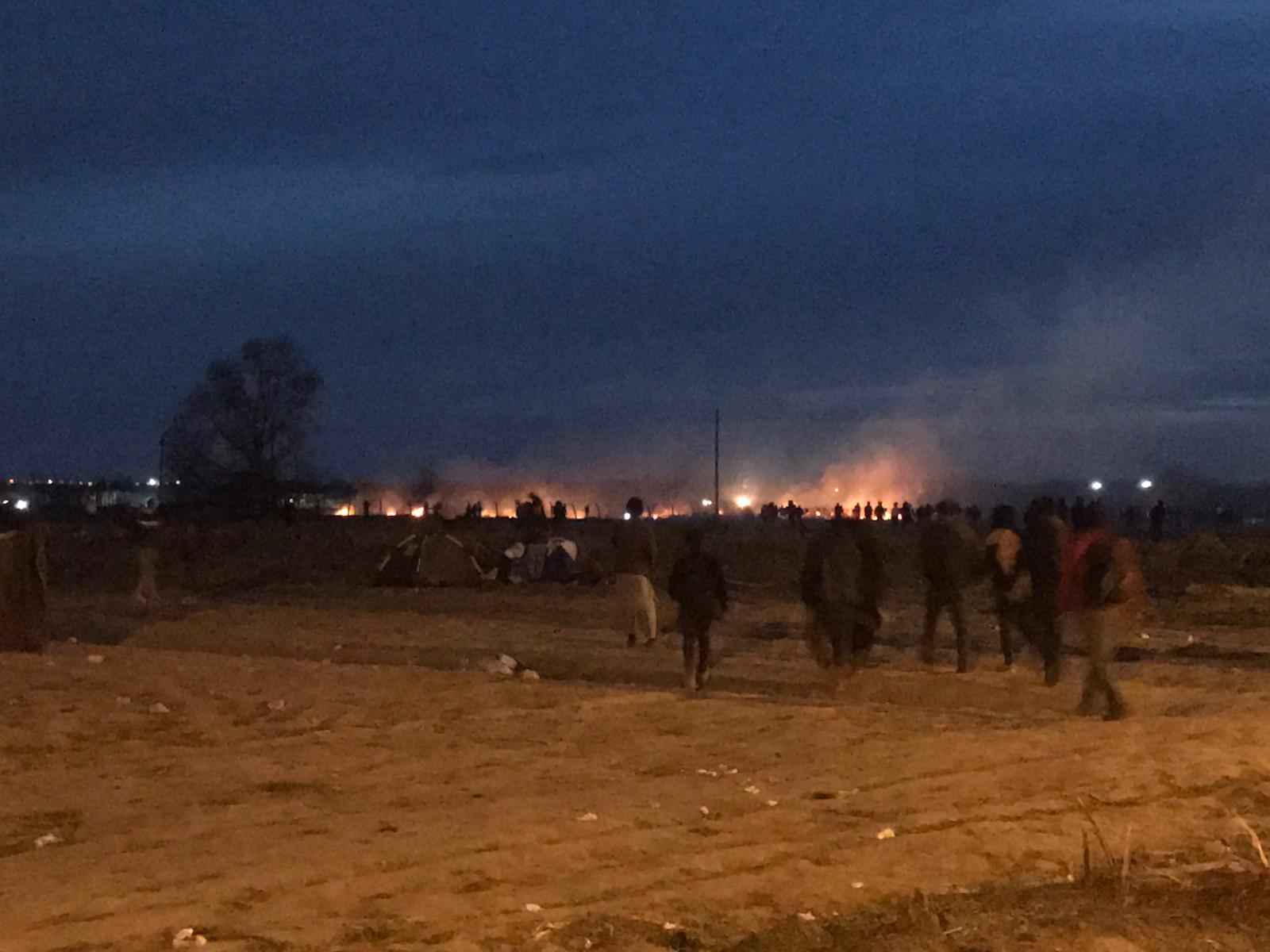
Shootings, Torture and Push-Backs at the Borders
News about people being shot by Greek border guards on the Greek-Turkish land border appear with increasing frequency. On social media information circulate about at least 8 people brought to hospital with gunshot wounds. Videos how that people have been killed, being stripped naked, beaten and tortured and pushed back from Greece to Turkey in mass expulsions. The murder of a young Syrian on Monday has already been analysed in detail by Forensic Architecture. In some areas around the Evros river people were blocked from two sides when special units of the Turkish police were mobilised to oppose the Greek pushbacks. Migrants report that they have been beaten also from the Turkish side and a video shows how families were transported to the border in busses and forced to get out.
The Greek government also announced a so-called “exercise with heavy weapons” carried out on the coast of Lesbos towards the sea in the direction of Turkey by the Greek government. Furthermore, a restricted navigation in the sea came into power, which bans any type of non-commercial or private activities in the waters around the northern Aegaen Islands. At the same time, there are more and more reports about refugees being brutally attacked by groups of masked people in cooperation with the Greek coast guard in the Aegean Sea. The engines of rubber dinghies were destroyed, boats pierced in the open sea or attempted to be capsized. Shots were fired at people in rubber dinghies. A child drowned. To an extent, the Turkish coast guard is still active in the sea, even carrying out pull-backs from Greek waters. Meanwhile, the Frontex units stationed in the Aegean were passively holding back.
Criminalization of Migrants and Suspension of Asylum Law
Adding to this, the Greek government announced that the right for asylum will be suspended for all new arrivals. Already about 500 people who arrived on Lesbos are currently held in the port of Mytilene and scheduled to be brought to a closed camp on the mainland on Saturday, 7th of March, presumably to be held in a military base in the town of Serres. From there, they will be deported without any asylum procedure.
Moreover, people seeking protection have also been criminalized and prosecuted. The number of cases is unclear but some newspapers reported about 17, others 45 and even about 183 people who crossed the border in Evros region and have been sentenced with charges of 3 to 4 years of prison with fines around 10,000 Euros. On Monday, seven men were sentenced to 3 years imprisonment on Lesvos for “illegal entry”, where three more trials are planned against unaccompanied minors in May. Many other trials are expected to follow.
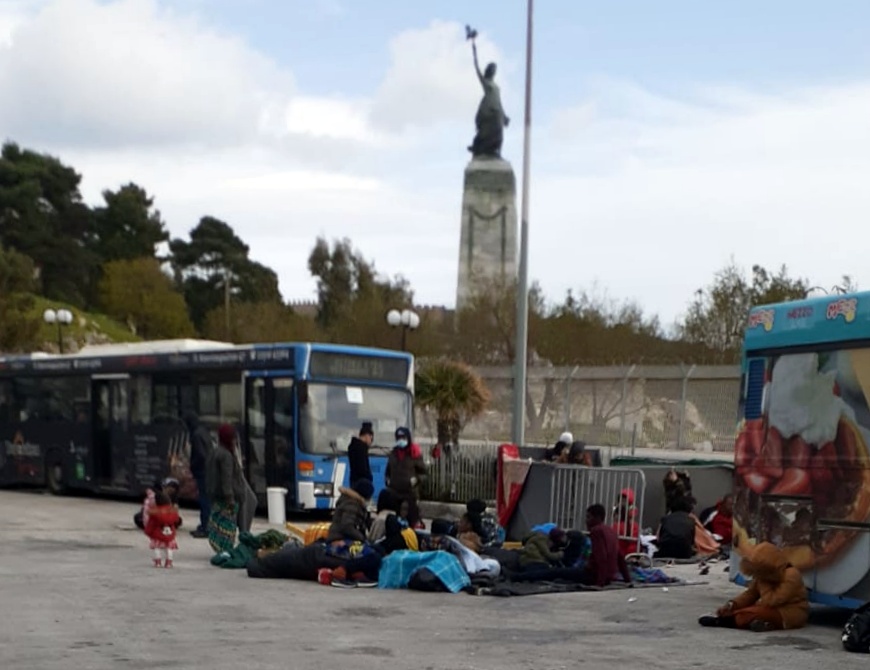
Fascists Hunting Down People on Lesvos
Meanwhile, the hell of fascist violence has broken loose on Lesvos and Chios. Right-wing groups are hunting migrants and building blockades along the streets to check cars and their occupants. If they are not Greek or supposedly working for NGOs they are attacked and their vehicles have been smashed. The escalation of violence started after the Greek government announced the plan to construct new closed camps on the islands. Soon after the camp Stage 2 in the northern part of Lesvos was set on fire. Even the UNHCR was not spared from violence and several aid workers and volunteers were intimidated and decided to leave the islands. People were injured, their photos shared on Facebook among fascists groups and advertised for hunt. Shoreline response and sea monitoring teams who have been doing emergency response and monitoring for years were also attacked, while the police frequently disrupts their work. Simultaneously, right-wing groups prevented asylum seekers from landing and disembarking the boats.
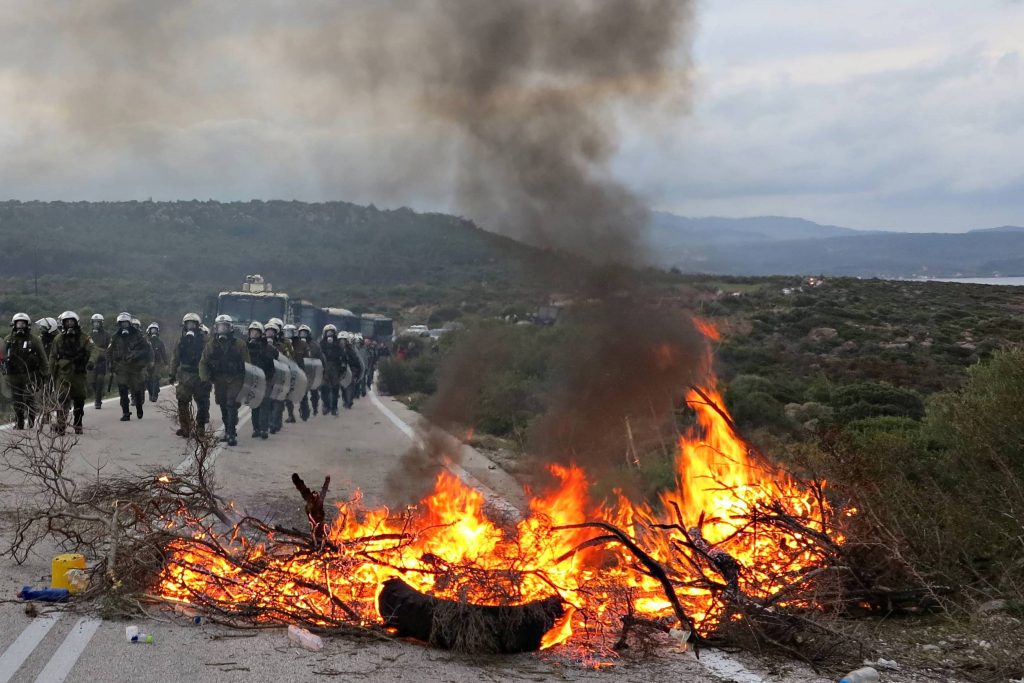
Declaration of bankruptcy by the European Union
What is the EU’s stance on these developments? It should be self-evident that the brutal violence and the shooting of people in Europe would cause investigations for murder. It would be expectable that the suspension of the fundamental right for asylum, which directly violates the European Human Rights Charter and the Geneva Refugee Convention, should be seen as a scandal to be immediately sanctioned by the EU. At least that the EU should speak against the horrifying fascist violence unleashed against their own humanitarian organisations.
But none of that is happening. The president of the EU Commission, Ursula von der Leyen, does not seem to be particularly concerned about the brutalized violence within Europe. She praised Greece for being the “European shield” because “this border is not only a Greek border, it is also a European border” and promised Greece financial support of 700 million. Border reinforcement will be further strengthened through a RABIT operation by the European border and coast guard agency Frontex.
The eternal mantra that the events of 2015 must not repeat has become so deeply imprinted into the public’s mind that any violence seems to have become acceptable as long as refugees are prevented from entering Europe. This is visible not only through the absurd hysteria about refugees at the border, but also the almost fascinating irrationality. With its violent isolationist policy, the EU is not only exposing its much-vaunted fundamental human rights values to ridicule, but is also becomes the toy of the Erdogan government.
Accompanied by a chess-like played media coverage, refugees were released from deportation centres and collectively transported with buses to the Evros border and the Turkish coast while others joined on their own. The departing boats were filmed by state television companies and sent to the EU as a threat. It was a military counter-strike in the Syrian war. Refugees are being abused as a bargaining chip by the Turkish government to blackmail the EU and NATO to cooperate in the Syrian war.
The EU panics, although the EU-Turkey Deal is not even suspended. Deportations to Turkey continue and Turkish border guards are at least partially active. The estimated 130,000 people who would have crossed the border were never registered in the EU, and within three days only around one thousand refugees arrived to the islands. The absolute numbers of crossings in the Evros border remain low.
What’s much more frightening than Turkish power politics is the helplessness of the EU: Receiving the approximately 13,000 people from the border would be an easily achievable and legally required act for the EU with its almost 450 million inhabitants. But today, it apparently rather accepts those seeking protection to be shot than to break its dependency on Erdogan.
Sticking to the Birth Defect of European Migration Policy
While people are dying, beaten and instrumentalized in a dirty geopolitical game, the core failure is that the EU continues to firmly hold on to the EU-Turkey deal. Instead of learning from the fatal errors, the architect of the deal Gerald Knaus now speaks of an “Agreement 2.0 between the EU and Turkey”. Apparently, there can be no thinking out of the box, since the basic principles of the European border policy are based on blackmail and dependency on authoritarian regimes that do the dirty work for them. As soon as this relationship begins to falter, it becomes obvious that the policy is built on the basis of disenfranchisement. Shooting people at the border is only the logical consequence of a policy that systematically denies access to asylum.
In doing so, the EU fails to recognise the real dangers: Its policies lead not only to the death of refugees, but also to the fascistisation of Europe. A direct line can be drawn from the racist murders in Hanau to fascists hunting refugees and attacking support structures on Lesvos. It is therefore not surprising that right-wing networks in Germany are calling for people to go into battle at the EU’s external border and hunt people down. Luckily, they are received roughly by the local Antifa.
V.H.
[Evros/Türkei/Griechenland] Aktuelle Infos und tägliche Updates zur Situation an der Grenze
Unsere türkischen Freund*innen von Göçmen Dayanışması berichten täglich zur Situation am Evros der türkisch-griechischen Grenze:
https://enoughisenough14.org/2020/03/05/notes-from-pazarkule-evros-the-fourth-day/
http://gocmendayanisma.com/2020/03/05/pazarkule-evrostan-notlar-besinci-gun-notes-from-pazarkule-evros-the-fifth-day/
[Evros/Türkei/Griechenland] Gemeinsames Statement: Transnationale Solidarität gegen Krieg und Rassismus!
[Evros/Türkei/Griechenland] Hunderte Gruppen weltweit unterzeichnen vielsprachigen Aufruf für Frieden, Grundrechte und Recht auf Bewegungsfreiheit für alle Flüchtenden. Wir unterzeichnen den Aufruf unserer türkischen Freund*innen (https://crossbordersolidarity.com/#German):
Fünf Jahre nach der sogenannten „Flüchtlingskrise“ und fast vier Jahre nach dem EU-Türkei-Deal werden wir erneut Zeug*innen der Gewalt, die durch sicherheitsorientierte Migrationspolitik verursacht wird. Seit dem vergangenen Donnerstag (27.02.2020) zogen tausende Menschen in Richtung der türkisch-griechischen Grenze, nachdem angekündigt wurde, dass Migrant*innen, die Europa erreichen wollen, von türkischer Seite nicht länger daran gehindert werden. Diese Ankündigung türkischer Regierungsbeamter erfolgte nach dem Tod von 33 türkischen Soldaten in der Region Idlib. Dort hat die Eskalation des Konflikts die Zahl der zivilen Todesopfer von Tag zu Tag rapide erhöht, offenkundig wurden grundlegende Infrastruktur- und Gesundheitseinrichtungen beschossen. Die türkische Regierung hält ihre Grenzen zu Syrien geschlossen, sieht jedoch keine Schwierigkeit darin, tausende Migrant*innen vor die Türen Europas zu drängen – wo sie in einem Schwebezustand verharren.
Migrant*innen und Asylsuchende aus Syrien, Afghanistan, Pakistan und mehreren afrikanischen Ländern haben die Grenzgebiete Edirne, Çanakkale und İzmir erreicht. Einige wurden mit Bussen von Gemeinden dorthin gebracht, andere mit privaten Taxis oder zu Fuß. In der Region Edirne wurde ihnen von den türkischen Behörden gestattet, ins Grenzgebiet zu gelangen, doch die griechischen Polizeikräfte verhinderten den Grenzübertritt mit Tränengas und Blendgranaten. Gleichzeitig beschränkten die türkischen Behörden den Zugang für Journalist*innen und Reporter*innen. Diejenigen Migrant*innen und Asylsuchenden, die in der Grauzone zwischen den beiden Staaten festsitzen, im starken Regen und mit nur wenig Nahrungsmitteln, riefen nach der Öffnung der Grenzen. Einige derjenigen, die die Landgrenze erreichen, wurden von den Behörden angewiesen, trotz gefährlicher Wetterbedingungen auf den Seeweg zu gehen.
In Griechenland verschlechtert sich die Situation ebenfalls. Die Regierung hat kürzlich ein neues, strengeres und noch unmenschlicheres Asylgesetz verabschiedet, das die Inhaftierung aller neu ankommenden Asylbewerber bei ihrer Ankunft auf griechischem Gebiet vorsieht. In den vergangenen Tagen kam es zu Auseinandersetzungen zwischen Menschen aus Orten auf den Inseln Chios und Lesbos mit der Bereitschaftspolizei, als dort neue Hafteinrichtungen errichtet werden sollten. Unter der Belastung der sogenannten „Flüchtlingskrise“ seit dem EU-Türkei-Deal protestieren die Menschen gegen die Verschlechterung ihrer eigenen Lebensbedingungen und gegen die Lebensbedingungen der dort Asylsuchenden gleichermaßen. Fremdenfeindlichkeit und Rassismus haben jedoch nie aufgehört, Teil des öffentlichen Diskurses zu sein. Als Reaktion auf die jüngsten Ereignisse haben griechische Regierungsbeamte ihrerseits Hass und Angst geschürt, indem sie den Mythos einer Invasion von „Illegalen“ auf Geheiß ihres Nachbarlandes verbreitet haben.
Fremdenfeindlichkeit, Rassismus und ihre Normalisierung müssen überall bekämpft werden, wo sie erscheinen, sei es in der Türkei, in Griechenland oder anderswo. Die Instrumentalisierung des Lebens von Migrant*innen, Asylbewerbern und Geflüchteten, welche auf eine Bedrohung und einen Faustpfand reduziert wurde, muss beendet werden. Sowohl in nationalen Wahlkämpfen, als auch in den Beziehungen zwischen der türkischen Regierung und der EU. Eine Sicherheitspolitik, die tausende bereits Vertriebener in einen Schwebezustand treibt, und die Grenzregime, die einen endlosen Kreislauf der Gewalt gegen Migrant*innen, Asylbewerbern und Geflüchteten mitverursachen, müssen damit aufhören. Was wir fordern, sind Frieden, Grundrechte und die Freiheit aller Menschen, die in Bewegung sind.
Grenzen töten, öffnet die Grenzen!
Stoppt den Krieg gegen Geflüchtete und Migrant*innen!
Transnationale Solidarität gegen Rassismus und Krieg!
Für eine freie Welt ohne Grenzen, Ausbeutung und Exil.
[Ellwangen] Polizeieinsatz in Ellwangen – Letztes Verfahren gegen Geflüchteten eingestellt.
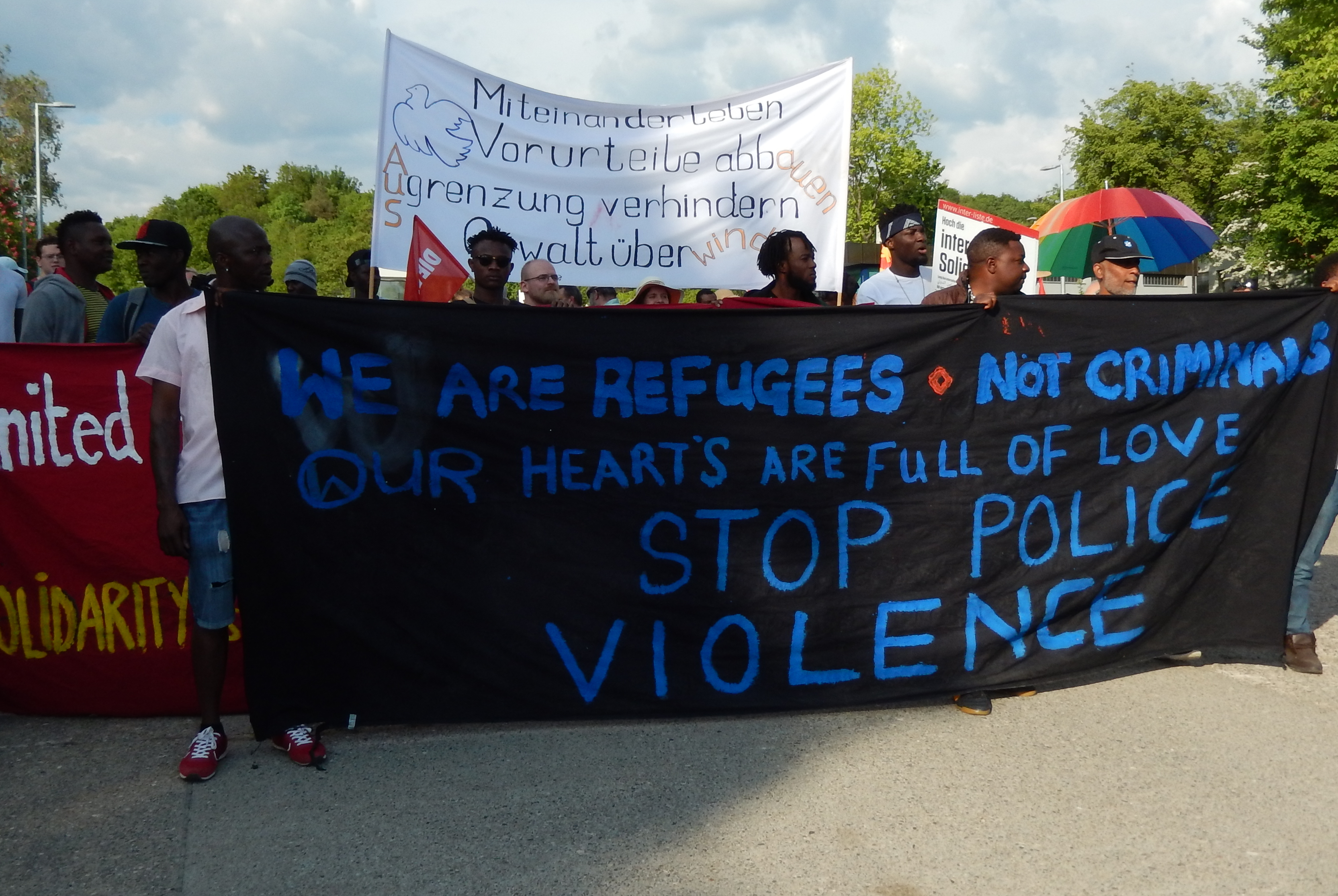 In den frühen Morgenstunden des 3. Mai 2018 hatten etwa fünfhundert Polizisten in Kampfausrüstung die afrikanischen BewohnerInnen im Geflüchtetenlager Ellwangen überfallen und dabei mehrere Menschen verletzt. Einige der afrikanischen Geflüchteten wurden in Untersuchungshaft genommen. Innerhalb weniger Wochen erhielten etwa zwanzig Geflüchtete einen Strafbefehl von bis zu neunzig Tagessätzen, einige wurden sehr schnell zu Gefängnisstrafen bis zu sechs Monaten verurteilt.
In den frühen Morgenstunden des 3. Mai 2018 hatten etwa fünfhundert Polizisten in Kampfausrüstung die afrikanischen BewohnerInnen im Geflüchtetenlager Ellwangen überfallen und dabei mehrere Menschen verletzt. Einige der afrikanischen Geflüchteten wurden in Untersuchungshaft genommen. Innerhalb weniger Wochen erhielten etwa zwanzig Geflüchtete einen Strafbefehl von bis zu neunzig Tagessätzen, einige wurden sehr schnell zu Gefängnisstrafen bis zu sechs Monaten verurteilt.
Einige Geflüchtete akzeptierten die Strafbefehle nicht und legten Widerspruch ein. Alle mit Erfolg. In der zweiten Februarwoche 2020 wurde ohne Begründung das letzte Verfahren eingestellt. Zuvor waren zwei Verfahren im Rahmen des Jugendstrafrechts ohne Verhandlung eingestellt worden (Diversion). Ein Verfahren wurde wegen einer – inzwischen aufgehobenen – Abschiebeanordnung eingestellt. Für die erste Verfahrenseinstellung im Januar 2019 war noch eine Verhandlung beim Amtsgericht Ellwangen notwendig gewesen.
Hintergrund der Verfahrenseinstellungen und damit der Rücknahme der Strafbefehle ist die fehlende Rechtsgrundlage für den Polizeiüberfall. Im März 2019 äußerte selbst Amtsgerichtsdirektor öffentlich Zweifel an der Rechtmäßigkeit des Polizeieinsatzes. Er forderte die Staatsanwaltschaft zu Nacharbeit und Belegung der Rechtsgrundlage auf. Das ist dieser offensichtlich nicht gelungen. Die Verfahren mussten eingestellt werden.
Beim Amtsgericht Stuttgart ist die Klage eines Geflüchteten gegen den Polizeieinsatz anhängig. Seit bald eineinhalb Jahren schweigt das Amtsgericht Stuttgart dazu. Will es warten, bis sich die Öffentlichkeit nicht mehr daran erinnert, wie der Polizeiüberfall von den meisten Medien und vielen Politikern einschließlich Winfried Kretschmann bejubelt wurde?
Wir fordern die Aufhebung aller Urteile im Zusammenhang mit dem Polizeiüberfall am 3. Mai 2018 und eine Entschädigung der verurteilten Geflüchteten. Dies wäre jenseits der wohlfeilen Reden zu Hanau eine konkrete Maßnahme gegen den Rassismus in dieser Gesellschaft.
[Lesvos] A Retrospective on January 2020 by No Border Kitchen Lesvos
We share a text from No Border Kitchen Lesbos:
Greece: A Retrospective on January 2020 by No Border Kitchen Lesvos (from Stop War on Migrants)
Just one month has passed in the new year and it already casts a grim shadow over the months yet to come. Blow after blow, new atrocities occur, and the government issues one fascist decision after another. Public outcry is absent.
Still, almost every day people set out on the dangerous journey across the straits between Turkey and Europe. Forced by a system that criminalizes and negatively stigmatizes migration, people unsafely have to board boats and leave everything behind, in the hope of a better, normal life – and for the EU (and within it the Greek government) no effort seems too big or too expensive to crush said people, no matter the cost.
The numerous shipwrecks in this month alone shows yet again how dangerous the crossing is. The Turkish coast guard rammed a rubber dinghy, 4 people drowned, one person went missing – and the excuse of missing safety precautions on board is accepted without comment. A fiber boat broke, 11 people died, of whom 8 were children – but the outcry is absent.
Driven in desperation by a dehumanizing and exclusionary system, a man finds himself during the first days of January in prison. He is locked away in solitary confinement, out of sight. He is a man with known psychological problems and he is left alone. Nobody will take responsibility for him. Death appears to him as the only way out of this hell.
In response to this, approximately 150 people took to the streets to protest against Moria Camp and the conditions in its prison. In a public statement (in several languages), the violent methods, which are de facto torture, were criticized, and the release of all prisoners demanded, as well as the closure of Moria camp and freedom of movement for all.
Towards the end of the month around 300 women protested in the streets of Mytilene with slogans such as “we want to be free, we want to be human”. They criticized the horrible living conditions in Moria camp and the ongoing violence. Meanwhile, another hundred women were prevented from participating in the protest and were blocked at the streets entering Mytilene. More than ten non-refugee women that attended the demonstration were removed and taken to the police station. The police were of the opinion that it was they who organized the rally, based on no evidence and only prejudice, the racial prejudice that the refugee community were unable to organise the demonstration themselves, and that it must have been done for them.
Women have to live under constant fear of assaults and rape. Medical help for pregnant women is barely existent. General medical support is scarce. Children grow up in a hostile environment. They are denied their childhood. But the outcry is absent.
Over 20,000 people are currently stuck in and around Moria camp, having to call it their home. Basic needs are not even close to being met. The ideal environment for violence has resulted in several attacks. Already more than 10 people have been injured and hospitalized since the start of the year. Among those, two men were killed. Some no longer dare to stay in the camp and see themselves forced to endure the cold winter nights in public places. But the outcry is absent.
On January 22nd, with the slogan: “we want our islands back!”, thousands of Greek civilians went on strike and protested the government’s refugee policy. The general strike was supported by the broad public, and a poster with their inflammatory demands could be seen in countless shops and stores of Mytilene, resulting in the largest protest in the history of Lesvos. Thus, domestic politics evaporates, and the belief that those who have newly arrived are to blame for the old, structural problems of the country spreads.
This is a perfect example of the recently formed government confirming its desire to show hardness and “strength” by implementing xenophobic policy. Championing the ideal of “out of sight, out of mind”, the first closed camp is already being built on the island of Samos, afar from any civilization. Men, women and children are to be imprisoned there on a general basis, their only “crime”: they came to Europe. They shall be imprisoned for 25 days. Within this time, it is supposed to be decided who is allowed to stay and who will be deported. The new law, however, provides for numerous possibilities to extend detention – up to 18 months if the asylum application is rejected. In addition to this, the time limits for appeals has been shortened, and any appeal must be submitted by a lawyer. This gives rise to the fear that under these circumstances many will not find a representative in time to appeal against a negative verdict.
But the government cannot wait for the completion of the closed camps to achieve their goal. Thus, on the last weekend of January, 55 people, most of them families, were locked up in a wing of the prison on Kos island. EU law ubiquitously requires a case-by-case assessment of whether there is a reason for imprisonment, and the Greek government flagrantly shows a clear disregard for such legal principle. If even legal principles are so publicly ignored, how are we to believe that any moral or ethical principles, such as a basic human right such as migration, will ever be followed?
Help and support will never be close at hand. The dehumanization continues. Imprisonment of the innocent, even children, is legitimized by our xenophobic system. But the outcry is absent.
The closed camps are intended to accelerate and intensify deportations. By the end of 2020, the government wants to deport 10,000 refugees to Turkey – five times greater than the total number of deportations since the EU-Turkey deal was made. So far, in accordance with former practice, many deportations have been prevented (or at least delayed) with the argument that the horrific conditions in Turkey classify a return as unsafe. However, the Greek government has installed a new judiciary for decisions in regards to deportation, and hopes they will decide differently. But the outcry is absent.
The European Union continues to fully support and implement the entire system. They don’t only demand more “effective (frequent)” deportation but also demand the doubling of EASO (European Asylum Support Office) staff officials to carry out the heinous act. It is not the only staff increase. The cruel, so-called “defenses” continue. The government announced to have 1200 more border police officers in the coming months. Already 400 jobs are advertised for the borders at the river Evros, and 800 are to be added on the Aegean islands.
Now they also want to install a floating dam system on the water. How exactly this is supposed to keep boats away is unclear to everyone. Considering that Lesvos is roughly 70km long, the 2.7km long barrier with blinking lights does not invoke an effective approach to the “issue”. The half a million-Euro project seems even more senseless when one takes in to account that people who are stopped by the barrier have already reached Greek territorial waters, and would therefore have to be rescued and taken to Greek soil under maritime law. But the outcry is absent.
As well as this, Stage 2 was closed on the 31st January. Stage 2 was the short-term transit camp to ensure people who land on the northern coast can access safety and receive medical aid and shelter. Over half of the total arrivals on Lesvos are on the northern shore. With closing Stage 2, people arriving will be left waiting for hours on beaches, by the side of the road, or in remote rocky areas, with no access to immediate shelter, protection or medical aid; some may even attempt to walk for hours to the south. But the outcry is absent.
Irony screams out, with all of the events aforementioned taking place in the same month in which the liberation of Auschwitz was remembered during the 75th anniversary of it’s closure, with politicians from left to right wing parties proclaiming: “never forgive, never forget!”. But they do forget. They forget all people who are not wanted in Europe because of their country of origin. They forget the tens of thousands of people who lost their lives because of the current EU policy. They forget the children who have experienced nothing else in their whole life than war, conflict zones and flight, and now are forced to live in hostile environments which provoke child suicide attempts. They forget all the young people who are condemned to do nothing, full of potential – potential Europe desperately needs, but apparently would be provided by the “wrong” people. They forget humanity in view of their own political and economic interests. They forget that fascism is in our midst and again the majority is not only watching but willfully ignoring. Thus, new atrocities take place over and over– but, once again, the outcry is absent. Deafeningly, forever absent.
United we stay- divided we fall.
No borders
Solidarity will win
[Greece] Solidarity statement: Freedom for Hamza & Mohamed!
first published on https://www.borderline-europe.de/unsere-arbeit/gemeinsames-solidarit%C3%A4tsstatement:
Solidarity statement: Freedom for Hamza & Mohamed
The European Union must stop the arbitrary incarceration of refugees and migrants
We express our solidarity with Hamza Haddi and Mohamed Haddar who are currently being held in pre-trial detention in Komotini, Greece. Both are facing long prison sentences because they are being wrongfully and arbitrarily accused of “smuggling”.
Hamza Haddi and Mohamed Haddar are Moroccan citizens who fled their country searching for protection and better living conditions, Hamza Haddi in particular is a known political activist who was hoping to be granted political asylum in Europe. In Morocco, he is facing political persecution for his activities during the Arab Spring as well as for his engagement with the Moroccan Human Rights Association L’Association Marocaine Des Droits Humains AMDH. He has been imprisoned three times and, together with his family, been constantly targeted and intimidated by Moroccan authorities. Hamza is a political refugee.
With Europe’s ever-increasing closure of borders and the impossibility for refugees to legally enter Europe and claim asylum, they were forced to embark and risk their lives on a makeshift boat. Hamza, who had fled from Morocco together with his brother Yassine went on to meet two companions on the way; Reda and Mohamed in Turkey. There, they spent only a few days before attempting to cross the Evros river that marks the border between Turkey and Greece in July 2019.
In Greece, the four arrived, only to be immediately arrested by Greek border police. But not enough. Hamza Haddi and Mohamed Haddar are now accused of and are facing trial for the “smuggling” of two persons – one of them being Hamza’s own brother Yassine!
The accusations against Hamza and Mohamed are clearly unfounded. They are refugees, not smugglers.
Their companion Reda was coerced into signing a testimony that is now being used to wrongly accuse Hamza and Mohamed as being the smugglers. Reda can neither speak nor read Greek and later confirmed that the written document does not match his statement.
Consequently since July 2019, Hamza and Mohamed have been held in pre-trial detention in Greece and are facing more than ten years of imprisonment each. The basis of their trail is placed upon a testimony signed under pressure and without an interpreter.
We are calling for their immediate release!
The case of Hamza and Mohamed is unfortunately not an isolated case but paradigmatic for yet another facet of Europe’s policy of closing borders and deterrence. While European supporters or so-called “human rights defenders” such as Carola Rackete or the iuventa10 have recently received a lot of attention and support after having become the target of increasing criminalisation, there is hardly any information nor support for those without a European passport facing the very same accusations. However, it is them who constitute the majority of those being arrested and imprisoned in Italy and Greece on grounds of alleged “smuggling” and “aiding illegal immigration”. Arrested immediately upon arrival, a lot of them disappear unknown and unheard of and with no access to support from outside.
The basis for this is Greek legislation that considers any person found to have driven a vehicle across Greek borders, entering Greece without required documentation, as a smuggler.
The arrests as well as trials that follow these often-unfounded accusations of smuggling are arbitrary. Police officers might accuse the person holding the tiller to steer the boat, or the one who communicated with the coast guard to call for help or simply someone who speaks English, to be a smuggler. In Greece, the average trial lasts only around 30 minutes, leading to an average sentence of 44 years and fines over 370.000 Euro. Suspects, or what we would deem ‘victims’ of this unjust legislation, usually have limited access to legal assistance, most of them relying on public defenders. Observers voice concerns about a “shocking lack of deep processing”, reporting that judgements are pronounced despite lack of evidence and poor quality of translation.
This statement is to express our solidarity with Hamza Haddi and Mohamed Haddar and all those criminalized and deprived of their basic rights in the European Union’s proclaimed fight against “smugglers”. We call on everyone to condemn the arbitrary application of anti-smuggling laws against people on the move, who are often already in fear of their lives. We denounce the exploitation of the vulnerable situation of asylum seekers by the EU member states, leaving them without the means to properly defend themselves.
Together with the Hamza Haddi and Mohamed Haddar support committee we demand:
• The immediate release of Hamza Haddi and Mohamed Haddar.
• All charges against them to be dropped, and their innocence to be recognized.
• Hamza’s asylum application to be accepted and his asylum granted.
• Regularisation of the situation of Hamza and Mohamed, and freedom of movement for all.
We further demand:
• Freedom for all those that are suffering the same fate, being imprisoned in Greek and Italian prisons because they were looking for a better life.
• A change in the Greek and Italian law in order to remove the legal grounds for these arbitrary arrests and convictions.
–> Attend the trial of Hamza and Mohamed on February 4th 2020 in Komotini, Greece!
–> Donate for their legal defence: https://www.lepotsolidaire.fr/pot/94duqw1k
– ADIF Associazione diritti e frontiere, Fulvio Vassallo Paleologo, Italy
– Adopt a Revolution
– Alarm Phone Watch the Med
– Prof. Dr. Annita Kalpaka, University Hamburg
– Antina Plath, Initiative Schwarze Menschen in Deutschland, Germany
– ARCI Porco Rosso, Palermo
– Prof. Dr. Astride Velho, Germany
– borderline-europe e.V., Germany
– Borderline Sicilia Onlus, Italy
– Carola Rackete
– Centre for Peace Studies, Zagreb
– Clandestina Thessaloniki, Greece
– Christian Peace Maker Team Lesvos, Greece
– Délinquants solidaires, France
– Demokratische Juristinnen und Juristen e.V., Germany
– Esc-Infomigrante, Rome
– European Civic Forum, Switzerland
– European Democratic Lawyers – Avocats Européens Démocrates
– Harald Bauder, Ph.D., Ryerson University Canada
– Il Comitato di Base No Muos di Palermo, Italy
– Institute of Race Relations, Anya Edmond-Pettitt, United Kingdom
– iuventa10
– Judith Gleitze, borderline-europe, Palermo
– Kontakt- und Beratungsstelle für Flüchtlinge und Migrant*innen e.V., Germany
– La FASTI, Fédération des associations de solidarité avec tou-te-s les immigré-e-s, France
– L’Association Marocaine Des Droits Humains, Morocco
– Loubna Messaoudi, CEO Founder BIWOC* Rising, Berlin
– Marie Amoyi, Initiative Schwarze Menschen in Deutschland, Germany
– Migreurop, Observatoire des frontières, France
– mediale pfade, Germany
– Mobile Info Team, Greece
– Münchner Flüchtlingsrat, Germany
– Observatory of Solidarity, Milan
– Refugee Law Clinic Berlin, Germany
– Republikanischer Anwältinnen- und Anwälteverein, Germany
– Rete Antirazzista Catanese, Italy
– Sea-Watch, Germany
– Seán Binder
– Seebrücke, Germany
– Solidarité sans frontières, Switzerland
– Solidarity Watch, Belgium
– Statewatch, United Kingdom
– TPC Maison Solidaire, France
– You Can’t Evict Solidarity, Germany
[Bulgaria] CALL FOR SOLIDARITY with the NO NAZIS ON OUR STREETS 2020 demonstration
Wir dokumentieren einen Aufruf unserer Freund*innen aus Sofia:
CALL FOR SOLIDARITY with the NO NAZIS ON OUR STREETS 2020 demonstration
No Nazis on Our Streets 2020 – Sofia, 22.02.20, 13.00 h, Banski Square
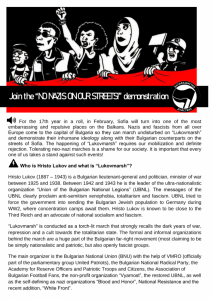
On the 22.02.2020, the neo-nazi Lukovmarsh will happen in Sofia for a 17th time. The Bulgarian neo-nazis will walk the streets of Sofia with their European counterparts. The march will probably be silently patronized by the municipality of Sofia and the higher levels of power in the country.
On 22.02.2020, the demonstration “No Nazis on Our Streets!” will also take place. After a Pan-European neo-nazi organization called Fortress Europe was established in Sofia in 2019, we think that it is time that society in the country has to wake up and stop its’ silent consent to its’ own fascization.
For us, antifascism is not a party or a person – it is a human position against far-right aggression and violence that has become a reality in the street, as well as a state policy.
Lukovmarsh will happen 75 years after the horror of the Holocaust. While Bulgarian politicians hypocritically go around the world and talk about a “Bulgaria that has saved its’ Jews”, formal and informal neo-nazi groups celebrate the memory of Hristo Lukov – a person who wanted their extermination. Today his ideological heirs appear in more and more places around the country, followed by more neo-nazi marches. At the same time, the Bulgarian “patriotic” government is making attempts for revisionism.
Public figures and media are flooding us with the cliches of the elite, while turning up people against each other: Bulgarians against people who are perceived as non-Bulgarians, heterosexuals against non-heterosexuals, women against men, even medical workers against doctors, the list can go on forever.
It is time to unite against the lies of racism, xenophobia, anti-semitism, homophobia and sexism! Against the lies of power and the state!
The streets are ours! Let’s take reclaim them on 22.02.2020!
In case you haven’t stumbled upon a call for the demonstration “No Nazis on Our Strees” before, here is some general information about why we are protesting Lukovmarsh:
Who are Antifa Sofia/ Antifa Bulgaria?
We are a group of people with pedominantly anarchist and anti-authoritarian ideas, who oppose traditional party structures and organizations. We have gathered in our attempts to stop the neo-nazi Lukovmarsh and oppose acts of far-right violence.
Who is general Lukov and what is “Lukovmarsh”?
“Lukovmarsh” is a classical fascist torch-lit march with hundreds of participants that occurs annually since 2003, in February, honoring the memory of the lieutenant-general, politician and minister of war Hristo Lukov (1887-1943), a supporter of Nazi Germany during the World War II, pressuring the government to send the Bulgarian Jews to death camps in Germany, leader of an ultra-nationalistic organization UBNL, clearly proclaim anti-semitism xenophobia, totalitarism and fascism. He was killed by Violeta Yakova, a woman of Jewish origin, member of the underground antifascist resistance in Sofia.
17 years ago, in 2003, the figure of Hristo Lukov was pulled out of the trash bin of history to be commemorated for the first time and the march in his honor has been happening ever since.
The formal and informal groups behind the organization of “Lukovmarsh”, along with most of the participants in the procession, represent the Bulgarian the vast majority of the Bulgarian extreme right and Neo-Nazi scene: the main organizer Bulgarian National Union, the nationalistic party VMRO (officially part of the parliamentary group United Patriots, currently in the government), National Resistance (famous for holding homophobic demos), Neo-Nazi ultras groups, the Bulgarian branch of neonazi organization Blood And Honor and others.
Why is transnational solidarity important?
Ultra-nationalists are already in the government. Parliamentary and extra-parliamentary nazi organizations are uniting against migrants, meeting up, marching together, holding conferences and showing “white international solidarity” more than ever to “protect Europe” as they claim. This was evident in the numbers of foreign supporters of Lukovmarsh lately, among which are: Spain (La Falange), Germany (NPD, Die Rechte, Der III Weg), France (Terre et peuple), Italy (CasaPound), Austria , Croatia (The Neo-Fascist Party), Poland (National Revival), Romania (Nova Dreapta), Hungary, Sweden (The Nordic Front), Russia (Russian Imperial Movement), etc.
Lukovmarsh is a good example for how the system “works” – for years, the march has been protested against. Even the Capital Directorate of Internal Affairs has published data that Lukovmarsh is an event in which members of pro-Nazi terroristic and criminal groups participate. Since 2014, the mayor of Sofia is formally “banning” the march, only later to let Nazis march with their torches, escorting them with a large number of police force. Meanwhile, political parties in close ties with the organizations behind Lukovmarsh are in the local, national and European power structures, holding a number of top positions. Constant hate-speech is promoted and widely welcome in the media, which has continuously used it to raise its audience’s moneymaking fears and racist stereotypes.
Below is our brochure if anyone wants to print and spread information on the subject:

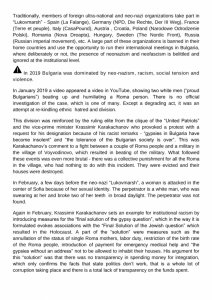
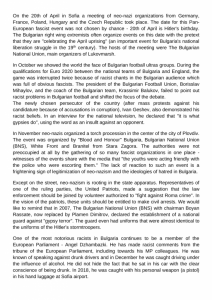
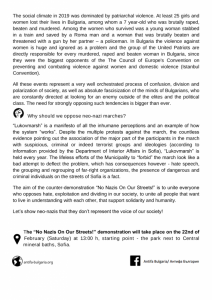
More Infos:
http://antifa-bulgaria.org/
https://www.facebook.com/events/113035276743896/
